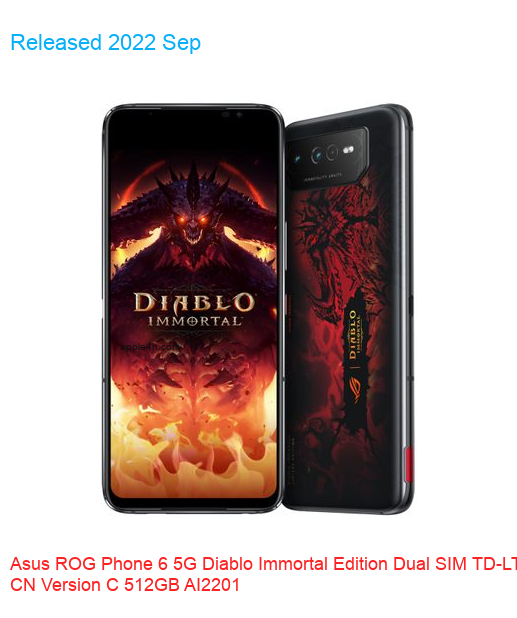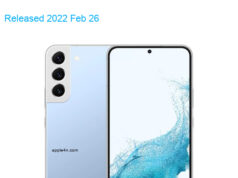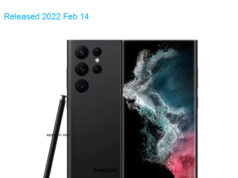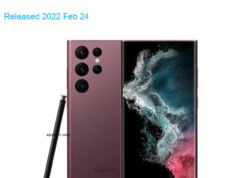| Brand | Asus |
| Model | ROG Phone 6 5G Diablo Immortal Edition Dual SIM TD-LTE CN Version C 512GB AI2201 |
| Released | 2022 Sep |
| Announced | 2022 Sep 19 |
| Hardware Designer | ASUSTeK Computer |
| Manufacturer | ASUSTeK Computer |
| Codename | Asus I2201A |
| General Extras | Haptic touch feedback , Tactile touch feedback |
| Device Category | Smartphone |
| Width | 77.25 mm |
| Height | 172.83 mm |
| Depth | 10.39 mm |
| Dimensions | 3.04×6.8×0.41 inches |
| Mass | 239 g |
| Platform | Android |
| Operating System | Google Android 12 (S) |
| Software Extras | Voice Command , Navigation software , Intelligent personal assistant , Face Recognition |
| CPU Clock | 3190 MHz |
| CPU | Qualcomm Snapdragon 8+ Gen 1 5G SM8475 (Palima), 2022, 64 bit, octa-core, 6144 Kbyte L3, 4 nm, Qualcomm Adreno 730 GPU |
| RAM Type | LPDDR5 SDRAM |
| RAM Capacity (converted) | 16 GiB RAM |
| Non-volatile Memory Interface | UFS 3.1 |
| Non-volatile Memory Capacity (converted) | 512 GB ROM |
| Display Diagonal | 172.2 mm |
| Resolution | 1080×2448 |
| Horizontal Full Bezel Width | 7.74 mm |
| Display Area Utilization | 82.0% |
| Pixel Density | 395 PPI |
| Display Type | AM-OLED display |
| Number of Display Scales | 1073.7M |
| Display Refresh Rate | 165 Hz |
| Scratch Resistant Screen | Gorilla Glass Victus |
| Graphical Controller | Qualcomm Adreno 730 |
| GPU Clock: | 818 MHz |
| A/V Out | DisplayPort |
| Audio Controller | Qualcomm WCD9385 |
| Microphone(s) | 3 |
| Loudspeaker(s): | stereo |
| Audio Output: | 3.5mm |
| Supported Cellular Bands | GSM850 , GSM900 , GSM1800 , GSM1900 , UMTS2100 (B1) , UMTS1900 (B2) , UMTS1700/2100 (B4) , UMTS850 (B5) , UMTS800 (B6) , UMTS900 (B8) , UMTS800 (B19) , CDMA800 (BC0) , LTE2100 (B1) , LTE1900 (B2) , LTE1800 (B3) , LTE1700/2100 (B4) , LTE850 (B5) , LTE2600 (B7) , LTE900 (B8) , LTE800 (B18) , LTE800 (B19) , LTE850 (B26) , LTE700 (B28) , TD-LTE2000 (B34) , TD-LTE2600 (B38) , TD-LTE1900 (B39) , TD-LTE2300 (B40) , TD-LTE2500 (B41) , TD-LTE3500 (B42) , TD-LTE3600 (B48) , NR2100 (N1) , NR1800 (N3) , NR850 (N5) , NR900 (N8) , NR700 (N28) , TD-NR2500 (N41) , TD-NR3700 (N77) , TD-NR3500 (N78) , TD-NR4700 (N79) bands |
| Supported Cellular Data Links | GPRS , GPRS C12 , EDGE , EDGE MSC12 , UMTS , HSUPA , HSUPA 5.8 , HSDPA , HSDPA 7.2 , HSDPA 14.4 , HSPA+ 21.1 , HSPA+ 42.2 , DC-HSDPA 42.2 , cdmaOne , CDMA2000 1x , CDMA2000 1xEV-DO , CDMA2000 1xEV-DO Rev A , LTE , LTE 100/50 , LTE 150/50 , LTE 300/50 , LTE 300/75 , LTE 300/100 , LTE 400/150 , LTE 450/50 , LTE 450/100 , LTE 600/50 , LTE 600/100 , LTE 1000/100 , LTE 1200/200 , LTE 2000/300 , NR 1500 , NR 2600 , NR 3700 , NR 4600 data links |
| SIM Card Slot | Nano-SIM (4FF) |
| Complementary Phone Services | Voice transmission , Voice speaker , Vibrate , Speakerphone , ANC , HD Voice , VoLTE , ViLTE |
| Dual Cellular Network Operation | Dual standby |
| Sec. Supported Cellular Networks: | GSM850 , GSM900 , GSM1800 , GSM1900 , UMTS2100 (B1) , UMTS1900 (B2) , UMTS1700/2100 (B4) , UMTS850 (B5) , UMTS800 (B6) , UMTS900 (B8) , UMTS800 (B19) , CDMA800 (BC0) , LTE2100 (B1) , LTE1900 (B2) , LTE1800 (B3) , LTE1700/2100 (B4) , LTE850 (B5) , LTE2600 (B7) , LTE900 (B8) , LTE800 (B18) , LTE800 (B19) , LTE850 (B26) , LTE700 (B28) , TD-LTE2000 (B34) , TD-LTE2600 (B38) , TD-LTE1900 (B39) , TD-LTE2300 (B40) , TD-LTE2500 (B41) , TD-LTE3500 (B42) , TD-LTE3600 (B48) , NR2100 (N1) , NR1800 (N3) , NR850 (N5) , NR900 (N8) , NR700 (N28) , TD-NR2500 (N41) , TD-NR3700 (N77) , TD-NR3500 (N78) , TD-NR4700 (N79) |
| Sec. Supported Cellular Data Links: | GPRS , GPRS MSC12 , EDGE , EDGE MSC12 , UMTS , HSUPA , HSUPA 5.8 , HSDPA , HSPA+ 21.1 , DC-HSDPA 42.2 , cdmaOne , CDMA2000 1x , CDMA2000 1xEV-DO , CDMA2000 1xEV-DO Rev A , LTE 100/50 , LTE 150/50 , LTE 300/50 , LTE 300/75 , LTE 300/100 , LTE 400/150 , LTE 450/50 , LTE 450/100 , LTE 600/50 , LTE 600/100 , LTE 1000/100 , LTE 1200/200 , LTE 2000/300 , NR 1500 , NR 2600 , NR 3700 , NR 4600 |
| Sec. SIM Card Slot | Nano-SIM (4FF) |
| Touchscreen Type | Capacitive multi-touch screen |
| Keyboard | Attachable QWERTY |
| Expansion Interfaces | No |
| USB | USB 3.0 / 3.1 Gen 1 / 3.2 Gen 1×1 |
| USB Services | USB charging , USB fast charging , USB Host , USB OTG 1.3 , USB OTG 2.0 , USB PD , USB PD 2.0 , USB PD 3.0 |
| USB Connector | USB C reversible |
| Max. Charging Power | 65.0 W |
| Bluetooth | Bluetooth 5.2 |
| Wireless LAN | 802.11a , 802.11b , 802.11g , 802.11n , 802.11ac , 802.11ax |
| Wireless Services | Wi-Fi Direct , Wi-Fi Tethering , WiDi , Wi-Fi Calling |
| NFC | NFC A , NFC B |
| FM Radio Receiver | No |
| Complementary Satellite Services | Simultaneous GPS , A-GPS , Dual-frequency GPS , Geotagging , QuickGPS , QZSS , NavIC |
| Supported GLONASS protocol(s) | L1OF |
| Supported Galileo service(s) | E1 , E5a |
| Supported BeiDou system (BDS) | B1c , B1I , B2a BeiDou receiver |
| Camera Placement | Rear |
| Camera Image Sensor | CMOS |
| Image Sensor Pixel Size | 1.00 micrometer |
| Number of effective pixels | 50.3 MP camera |
| Aperture (W) | f/1.90 |
| Zoom | 1.0 x optical zoom |
| Focus | PD AF |
| Min. Equiv. Focal Length | 23.8 mm |
| Video Recording | 7680×4320 pixel |
| Flash | dual LED |
| Camera Extra Functions | EIS , EIS (video) , Pixel unification , HDR photo , HDR video , Red-eye reduction , Slow motion video , Burst mode , Refocus , Touch focus , Macro mode , Panorama Photo , Face detection , Face tagging , Smile detection , Face retouch , Face retouch (video) , Intelligent scene detection |
| Aux. Camera Image Sensor | BSI CMOS |
| Aux. Cam. Image Sensor Pixel Size | 1.12 micrometer |
| Aux. Camera Number of Pixels | 13.1 MP aux. cam |
| Aux. Camera Aperture (W) | f/2.20 |
| Aux. Cam. Min. Equiv. Focal Length | 12.5 mm |
| Aux. Camera Extra Functions | HDR photo , HDR video , Burst mode , Panorama Photo , Face detection , Face tagging , Smile detection , Intelligent scene detection |
| Aux. 2 Camera Image Sensor | CMOS |
| Aux. 2 Camera Number of Pixels | 4.9 MP aux. 2 cam |
| Aux. 2 Camera Aperture (W) | f/2.00 |
| Aux. 2 Cam. Min. Equiv. Focal Length | 11 mm |
| Aux. 3 Camera Image Sensor | No |
| Aux. 4 Camera Image Sensor | No |
| Secondary Camera Placement | Front |
| Secondary Camera Sensor | BSI CMOS |
| Secondary Camera Number of pixels | 12.0 MP sec. cam |
| Secondary Video Recording | 1920×1080 pixel |
| Secondary Camera Extra Functions | HDR photo , HDR video , Burst mode , Panorama Photo , Face detection , Face tagging , Smile detection , Face retouch , Face retouch (video) , Intelligent scene detection |
| Sec. Aux. Cam. Image Sensor | No |
| Built-in compass | Yes |
| Built-in accelerometer | 3D accelerometer |
| Built-in gyroscope | 3D gyro |
| Additional sensors | In-screen FP sensor , Hall , L sensor , P sensor , Step counter |
| Protection from solid materials | Yes |
| Protection from liquids | 4 Protection against water sprayed from all directions, limited ingress |
| Battery | Li-ion polymer (LiPo) |
| Battery Cells in Parallel | Yes |
| Nominal Battery Voltage | 3.87 Volts |
| Nominal Battery Capacity | 6000 mAh battery |
| Nominal Battery Energy | 23.22 Wh |
| Talk Time: | 35.0 hours |
| Market Countries | China |
| Market Regions | Asia |
| Added | 2025-02-15 |
Specifications data description of this 📱Asus ROG Phone 6 5G Diablo Immortal Edition Dual SIM TD-LTE CN Version C 512GB AI2201📱
Title: Asus ROG Phone 6 5G Diablo Immortal Edition Dual SIM TD-LTE CN Version C 512GB AI2201 Specifications
Introduction:
Welcome, tech enthusiasts! Today, we’ll be diving into the specifications of the Asus ROG Phone 6 5G Diablo Immortal Edition Dual SIM TD-LTE CN Version C 512GB AI2201. This limited edition device offers cutting-edge features and top-notch performance for gaming and everyday use. 📅LAUNCH
Lineup:
The ROG Phone 6 is part of Asus’ Republic of Gamers (ROG) series, which caters to hardcore gamers and power users. This particular edition comes with an exclusive Diablo Immortal theme for fans of the popular game franchise. 🤖 OS 📅LAUNCH
Design: 🏋️
The ROG Phone 6 boasts a sleek and robust design with a metal frame and Gorilla Glass Victus on both the front and back. The phone features a unique RGB-lit ROG logo, which adds a touch of flair to its appearance. The device measures 173 x 77 x 10.3 mm and weighs 239 g. Additionally, the device is IPX4 water-resistant.
🌈 Display:
The ROG Phone 6 boasts a vibrant 6.78-inch AMOLED display with a resolution of 2448 x 1080 pixels (395 ppi). The display features a 165 Hz refresh rate, 1 ms response time, and a 20.4:9 aspect ratio. The device also features HDR10+ support, a 1,200 nits peak brightness, and a 5,000,000:1 contrast ratio, delivering a stunning visual experience.
🚀 Chipset 🔧:
Powering the ROG Phone 6 is the Snapdragon 8+ Gen 1 chipset, which features an octa-core CPU with up to 3.0 GHz clock speed. The device also comes with an Adreno 730 GPU for handling demanding games and graphics-intensive tasks.
💪 CPU 🖥️:
The ROG Phone 6 features a powerful octa-core CPU based on the ARM Cortex-X2 architecture, delivering smooth and efficient performance for even the most demanding tasks.
🎮 GPU 💻:
The Snapdragon 8+ Gen 1 chipset includes the Adreno 730 GPU, which delivers up to 30% faster graphics rendering than its predecessor. This results in smoother gameplay and improved graphics performance.
🧠 MEMORY 🗂️:
The ROG Phone 6 features a massive 16 GB LPDDR5 RAM, which delivers fast and efficient memory performance. Additionally, the device includes a generous 512 GB UFS 3.1 internal storage for storing games, apps, and media.
📷 CAMERA 🎥:
The ROG Phone 6 features a triple camera setup, including a 64 MP primary camera, a 13 MP ultra-wide camera, and a 5 MP macro camera. The device can record 8K videos at 30 fps and 4K videos at up to 120 fps. Additionally, the phone’s front camera features a 24 MP sensor for taking high-quality selfies.
🔈 SOUND 🎵:
The ROG Phone 6 features dual front-facing stereo speakers with Dirac HD Sound technology and support for Hi-Res Audio and DTS:X Ultra. The device also supports up to 7.1-channel surround sound for an immersive audio experience.
📡 COMMS 📶:
The ROG Phone 6 features a dual SIM slot with support for TD-LTE and TD-SCDMA networks. The device includes Wi-Fi 6E, Bluetooth 5.2, NFC, and GPS. Additionally, the device includes an extensive list of sensors, including a fingerprint sensor, accelerometer, gyroscope, proximity sensor, ambient light sensor, and a compass.
💡 FEATURES 🎁:
The ROG Phone 6 includes several notable features, including:
– AirTrigger 6 shoulder buttons for improved gaming control
– GameCool 6 cooling system with a vapor chamber and thermal paste
– AeroActive Cooler 6 accessory for enhanced cooling performance
– 6,000 mAh battery with 65-watt fast charging capability
– Ultrasonic sensors for AirTrigger 6 and additional touch controls
– Dual USB-C ports for charging and USB peripherals
– Customizable RGB lighting with Aura Sync support
🔋 BATTERY🔌 :
The ROG Phone 6 features a larger-than-average 6,000 mAh battery with 65-watt fast charging capability, providing long-lasting performance and rapid charging times.
Conclusion:
The Asus ROG Phone 6 5G Diablo Immortal Edition Dual SIM TD-LTE CN Version C 512GB AI2201 is an exceptional gaming device that offers top-notch performance, a stunning display, and a sleek and durable design. With a powerful CPU, GPU, and generous memory, the device is capable of handling even the most demanding tasks. Additionally, the device features a triple camera setup, powerful audio system, and extensive connectivity options. If you’re a serious gamer looking for a phone that can keep up with your needs, the ROG Phone 6 is an excellent choice. Don’t forget to leave a comment below and let us know what you think about the device! 🌐NETWORK,🤖 OS 🛠️,🚀 Chipset 🔧,📡 COMMS 📶,💡 FEATURES 🎁,🔋 BATTERY🔌








